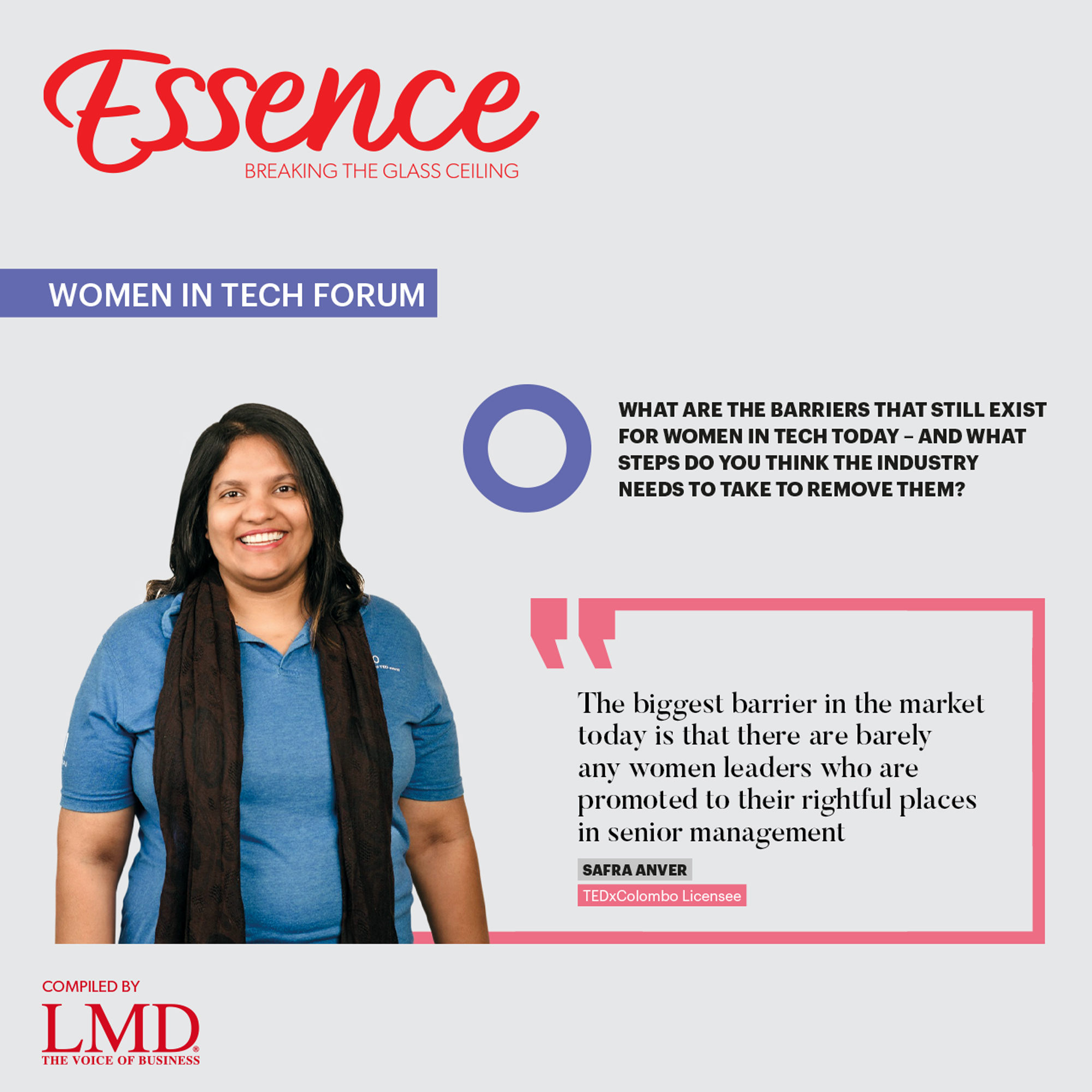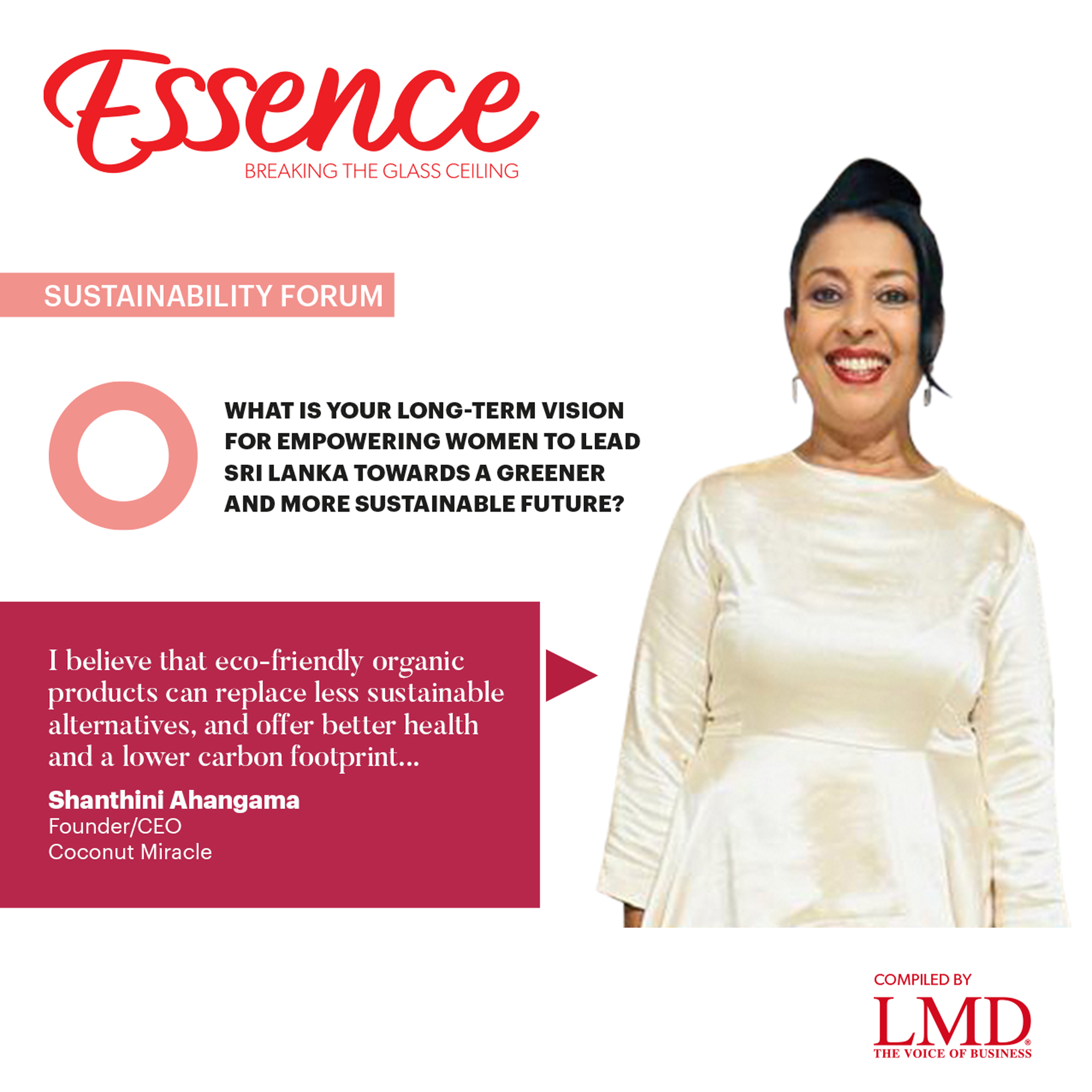STANDARD CHARTERED SRI LANKA
 Q: How do you view the business climate from a woman entrepreneur’s perspective?
Q: How do you view the business climate from a woman entrepreneur’s perspective?
Tamani Dias (TD): Many women entrepreneurs in Sri Lanka have proven themselves. This has provided great comfort to stakeholders – especially on the financing side – to step in and support their ventures.
In the microfinance sector, there is a strong preference for extending financing to support female groups as they tend to be reliable when it comes to repayment. However, a major roadblock that exists is the collateral requested when most financiers look to support new ventures, typically as females do not have major assets in their own names.
As such, targeted schemes for females with support to replace the request for collateral will contribute to the development of more female entrepreneurs.
Additionally, many organisations are also focussing CSR activities on creating and supporting female entrepreneurship.
At Standard Chartered, we support an internally developed programme – GOAL – which focusses on developing leadership in adolescent girls through sports and education in general life skills. Presently, five schools in the Moratuwa and Panadura areas are running this programme, using netball and karate.

Q: How do you view women’s representation in the public and private sectors?
TD: If you take the banking sector, there have been many female leaders representing the regulator – i.e. the Central Bank of Sri Lanka – and state banks and financial institutions. This has paved the way for many of us to be considered strong candidates for senior leadership roles in the sector.
Yet, more can be done to improve representation in parliament, living up to a country that boasted the first female prime minister in the world. The lack of opportunity has not enabled the public to see a woman’s capability in this sphere.
As a result, insufficient trust has been created among the general public for female Members of Parliament (MPs). It would also be great if female MPs were given the opportunity to broaden their sphere of influence and not be limited to subjects such as health, education, and childcare and women’s affairs.
In the private sector, the benefits of female representation at board level or in senior management are being acknowledged. Many large organisations are taking the lead and creating such opportunities for women, which is great. I believe that this will pave the way for many more women to be considered across the private sector.
At Standard Chartered, we have globally committed to achieving 30 percent representation in our board and I’m proud to be part of the Sri Lanka Country Management Team (CMT), which has a representation of 36 percent.
Q: So do Sri Lankan businesswomen have the potential to go global?
TD: I believe that both Sri Lankan businessmen and businesswomen have the potential to go global. The world does not base preferences on gender any longer – if your product or service is good, and you’re able to create a need, you can be successful.
As with most emerging markets, businesspeople in Sri Lanka have had to overcome many challenges to be successful, building resilience, tenacity and passion. This is a good platform to be successful in the global economy.
 Q: How crucial is it for women to assert themselves as valued members of the business world?
Q: How crucial is it for women to assert themselves as valued members of the business world?
TD: Females introduce a different viewpoint to the business world and looking at any decision from multiple angles is always good. Moreover, having women on boards and in senior management enables management decisions to be made with the female workforce taken into consideration. This is a powerful tool, given that most organisations have a large female population.
This will also be crucial in the future as two income households become a necessity and more females look to participate in the workforce.
Q: What can organisations do to address the loss of women employees at mid-career?
TD: Females opt to leave mid-career partly by choice and also because they lack other means to support growing families. Leaving by choice to support your children full-time is commendable.
However, if a woman loves her job, is productive and hardworking, and leaves because she has no choice, it’s indeed sad and a tremendous loss to the economy. These are the women that organisations should look to support.
As for my career, the primary action that helped me stay in my role was having an understanding and opportunity creating male superior – someone who understands that men and women cannot be judged and managed with the same yardstick; we get the job done but usually in a different style to our male counterparts.
If you understand that the primary difference with female employees is that they can multitask well, and give them the flexibility to handle both home and work, you’ll derive great results.
 Q: What is your vision for businesswomen in Sri Lanka?
Q: What is your vision for businesswomen in Sri Lanka?
TD: My vision is that we stop classifying ourselves as businessmen and businesswomen of Sri Lanka, and see the day when we’re all businesspeople driving the economy through entrepreneurship and leadership.
Furthermore, I hope that the required support framework is developed in the country across all stakeholders – be they the government, bankers or private chambers – to promote and enable those in the business community, both male and female, to meet the future needs of the local and global economy.
Q: How did Standard Chartered navigate the pandemic in terms of customer convenience?
TD: The pandemic enabled us to better extend the digital conveniences we had as it highlighted to our clients the importance of being ‘digital.’
Many clients had not moved to a digital platform despite its benefits. At the onset, given the sudden closure of the economy, shifting them to our established digital platform immediately proved to be difficult. Therefore, we took action to offer an alternative mechanism by which corporates were able to communicate and transact with the bank.
As such, no client was left unable to handle their banking requirements. Since then, we developed our team’s strengths to support a mass migration of clients to our platform Straight2Bank, which enables them to communicate efficiently and effectively.
Q: What is your perspective on how to bridge the gender gap in Sri Lanka?

Ransi Dharmasiriwardhana (RD): In my view, the gender gap in the workforce and boardroom should be addressed at the community and corporate levels. This begins with instilling a mindset of confidence in every girl child at a young age and by creating awareness among parents that children of both genders are equally important.
At the corporate level, bridging the gender gap in the boardroom begins by creating platforms that drive all forms of diversity as a collective organisational purpose.
This enables progression in the full employee cycle where women also enter, grow and reach maximum potential in their careers, through family friendly and respectful workplace policies that promote equal opportunities underpinned by performance.
Q: Where is Standard Chartered in achieving gender equality?
RD: While banking as a sector has seen stronger gender representation in Sri Lanka, I am proud to say that Standard Chartered is among those leading the way in this area. For the first time, we achieved 50:50 gender equality and also have a 36 percent female ratio on the CMT, as well as a 100 percent internal succession for female appointments to it!
Our success is the result of efforts over many years through our global platforms, many locally driven initiatives, local women’s network – W3 or Women Win @ Work – and the passionate country Diversity and Inclusion (D&I) Council, and our country human resources (HR) team, all of which have been instrumental in setting industry benchmarks in employment practices.
Gender is merely one component of D&I; all other aspects become equally important in creating a culture of inclusivity for all our employees.
Q: What have you done differently to achieve gender equality at Standard Chartered?
RD: I think it really begins with creating a culture that is transparent, performance oriented and most importantly, people centric – i.e. where all our employees feel valued. It’s a journey that the entire leadership team must believe in.
Some vital initiatives we have undertaken include implementing a Fair Pay Charter that focussed on and corrected gender pay disparity, conducted unconscious bias training programmes for all our people leaders, and introduced reverse mentoring and talent accelerator programmes, and numerous focussed personal branding sessions for upcoming female leaders.
We have also provided a crèche facility for our children from six months and a local buddy programme for mothers returning from maternity leave; ensured zero tolerance for sexual harassment and bullying; and continued focus on balanced succession planning – all while driving a human approach in everything we do.
Pushing industry norms, we were among the first to increase and introduce maternity, paternity and adoption leave – above and beyond the legal requirement to 20 calendar weeks for others, 14 calendar days for fathers and two calendar weeks for parents choosing to adopt.
We also recently concluded our two year partnership with IFC, the Australian government and 15 other organisations titled ‘SheWorks.’ Together with our D&I Champions, we worked on gender commitments ranging from the recruitment cycle, leadership development, childcare facilities, creating a respectful environment and of course, ensuring we ‘walk the talk’!
I’m also proud to say that Standard Chartered was recognised as one of the top 10 Best Workplaces for Women by Great Place to Work® Sri Lanka in 2019, and recently awarded the ‘Best Private Sector Organisation for Promoting Women in the Workplace’ by Women in Management (WIM), IFC and the Australian Government.
Q: As a female member of the CMT at Standard Chartered, what is your advice for young upcoming female talent?
RD: Firstly, to anyone who’s still schooling, I would urge them to gain work experience at a young age for exposure regardless of the role. I began working during the holidays when I was 16; and looking back, I think it really helped my confidence and financial independence at a young age!
Secondly, don’t be scared to take risks – to change paths if what you’re doing does not spark the ‘fire in the belly.’
 Upon graduating from university, I was working towards becoming a physical therapist but my first job was a management trainee in the retail arena. Since then, I’ve been in a variety of professions before finding my passion in HR.
Upon graduating from university, I was working towards becoming a physical therapist but my first job was a management trainee in the retail arena. Since then, I’ve been in a variety of professions before finding my passion in HR.
Thirdly, do not rush to complete the next qualification without knowing your passion and specialisation: I completed my master’s in organisational psychology after almost 10 years of work experience – when I was sure that HR was my future.
And finally, there will be multiple transitions as you grow in your career and it becomes essential to find an organisation that supports you in this journey. I’ve moved countries and taken career breaks, and even made decisions while holding back on roles outside Sri Lanka due to family commitments. These decisions become that much easier when you work for an organisation that supports your growth and enables flexibility every step of the way.
My message is to trust and believe in yourself to achieve what you put your mind to in an effort to be more self-aware of your weaknesses as much as your strengths, and do what drives you.
And when it doesn’t, be bold enough to change tracks and try something new!





